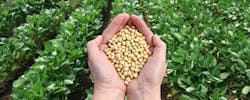Cargill Plans to Work With Farmers on Save-the-Forest Initiative
Cargill Inc., the world’s biggest agricultural company, plans to provide more transparency on its supply chain to customers and climate-change wary consumers in response to global concerns over deforestation.
America’s largest privately-held company has created a “sustainability hub” that will work with farmers in high-risk areas involving the crop's expansion for soybeans, cocoa and palm oil, executives from the Minneapolis-based company said. Cargill is also looking at ways to improve human-rights issues through its business practices.
“We’ve done an assessment of our various high-risk supply chains and we’ve said ‘You know what? We want to make sure what we say and what we do are consistent’,” said Ruth Kimmelshue, Cargill’s senior vice president of business operations and supply chain. “So we’ve taken the step to formalize in writing what our intention is and also a way to reflect what our actions are.’’
Cargill is one of the biggest buyers and processors of farm crops, with about 155,000 employees across 70 countries. As part of the initiative, Cargill will create metrics that will determine a baseline, and measure farmer progress moving forward and is expecting to issue an action plan by June 15.
The company is the “C” of the vaunted, “ABCD’s” of agriculture, along with Archer-Daniels-Midland Co., Bunge Ltd. and Louis Dreyfus Co. Cargill has bought and sold crops since 1865.
As the world’s population swells and more people adopt middle-class diets, demand for meat is expected to increase. Soybean-based products are used to feed livestock, giving an incentive for farmers in places like South America to expand acreage. That threatens native vegetation in areas like Brazil’s Cerrado savanna.
Meanwhile, consumers are increasingly curious about how their food is sourced and handled as it weaves from farms to grocery store aisles.
The company plans to issue an action plan by June 15. The initiative is the culmination of some of Cargill’s already existing practices, Devry Boughner Vorwerk, Cargill’s vice president of global corporate affairs, said in the telephone interview.
Sustainability issues are also tied to broader macro forces, they said. While this initiative was already in the works prior to the trade tensions between the U.S. and China, the spat underscores the potential for unintended consequences, they said.
China imposed retaliatory tariffs on U.S. farm goods, including soybeans. As a result, the world’s biggest buyer of the oilseed has increasingly sought South American supplies. That could send a signal for acreage expansion in the region.
“I was just down in Brazil last week,” Kimmelshue said. “It’s a real situation in terms of as the market moves it creates incentives for actors to behave in a certain way. And what it really highlights is the unintended consequence that we don’t always understand or that we don’t always consider.”
By Mario Parker and Javier Blas
About the Author
Bloomberg
Licensed content from Bloomberg, copyright 2016.
